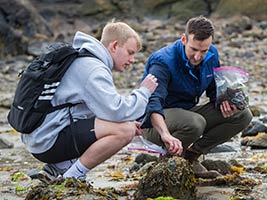New Environmental Science Faculty Brings a Marine Focus
For Assistant Professor of Environmental Science, Gordon Ober, the decision to join the faculty here at Endicott College was an easy one, and the Kittery, Maine, native is diving right in. He’s teaching, getting involved with the community, and soon hopes to set up an active lab. Endicott’s location is a plus for that.
“We’re sitting on the ocean which is just incredibly unique as far as any college is concerned,” he says.
Ober brings with him a marine focus and says that the College and the program are pushing in that direction. “We’re trying to maximize where we are geographically and really take advantage of that.”
“...we’re in a unique place at a unique time. We really want to plant the flag for the College in environmental science on the North Shore."
Ober attended the University of Connecticut and then the University of Rhode Island for graduate school. He most recently worked as a postdoctoral researcher at Claremont McKenna College, Scripps College, and Pitzer College outside of Los Angeles for three years before coming back in January to what feels like home.
Ober explains the importance of feeling connected to your environment, “I’m a marine scientist because I grew up on the beach in Maine. I used to love exploring tide pools while my family was sitting in the sand, so I’ve always had that connection. But having moved away for a few years I was forced to reset my bearings. In exploring a new area, I redeveloped an appreciation for the local, natural environment, and I knew that coming back to the northeast, this renewed appreciation would come with me.”

“Marine science is important—especially now—because we’re living in a time, where, in terms of our natural resources, the future is uncertain.” Explains Ober, “We as humans have always had this connection and draw to the coast and to the ocean. It is critical for us to gain a better understanding for how these ecosystems work if we want to be the best possible stewards.”
Ober explains how Endicott can enter into this global conversation, explaining that offshore wind farms and sustainable aquaculture are huge topics in the field of environment science. “We’re in a prime location to have a voice in that and we’re in a unique place at a unique time. We really want to plant the flag for the College in environmental science on the North Shore.”
Here’s more from Ober on environmental science at Endicott.
Why Endicott?
I spent time, both at undergraduate and graduate school, at larger Rhode Island research institutions. While I was always interested in staying on the academic track, I started to shy away from bigger institutions and wanted to work more with undergraduates. In my first postdoctoral position, I worked with three liberal arts colleges that shared a science department. I really enjoyed my time there working directly with students while also getting involved with a lot of high-level, novel research projects. That sold me on this position.
Tell us more about your marine science focus?
I’m a marine ecologist. I’m interested in how organisms interact with each other and how they interact with their environment. I’ve done work, mostly in New England before going out to California, trying to understand how certain aspects of climate change—whether ocean warming or ocean acidification—can impact how organisms respond to the change themselves and how they interact with one another.
How will you infuse this marine science focus more deeply into the environmental science curriculum?
I teach a plant biology class right now. As a graduate student my research and teaching focused on marine plants, things like seagrasses, seaweeds, and marsh grasses. I’ve infused a lot of that into this course, so we aren’t just talking about trees and terrestrial plants, but we’re talking about their distant relatives in the marine realm. These marine plants are really vital to our local habitats and ecosystems. In addition to exploring our forest trails on campus, we’ll be making frequent trips down to the salt marsh and the beaches to study the habitats of marine plants as well as collect and identify the numerous species found in this area.
How important do you think experiential learning is to the study of environmental science?
I think it’s critical, and I see experiential learning happening at different levels for Endicott students. I think it's necessary to incorporate as much hands-on learning as possible for students in the classroom. For my courses, I am relying on frequent trips to the field to take environmental measurements, or even just spend time observing their surroundings. It’s not until you get that connection and that experience in the field, that you start to put the pieces together about the things we’re discussing in class and maybe care a little bit more about the place that you live or the place you’re inhabiting. In addition, my research goals are not possible without student involvement. As such, students will have the opportunity to work with me on field or lab-based research, building necessary skills and gaining valuable experience in environmental research. For environmental science students, the local internship opportunities are endless. Environmental science is a field with many possible career paths, and I think the internship programs here allow for students to really see where they want their careers to go.
What makes Endicott a unique place for environmental science?
The location of the campus being on the ocean, but also having marsh habitats. It’s a natural lab. That was a big draw for me to come here. I can see myself setting up long time observational studies right off the coast here. I can easily bring classes out into the field and fold it into the curriculum.
To learn more about environmental science at Endicott, visit endicott.edu.